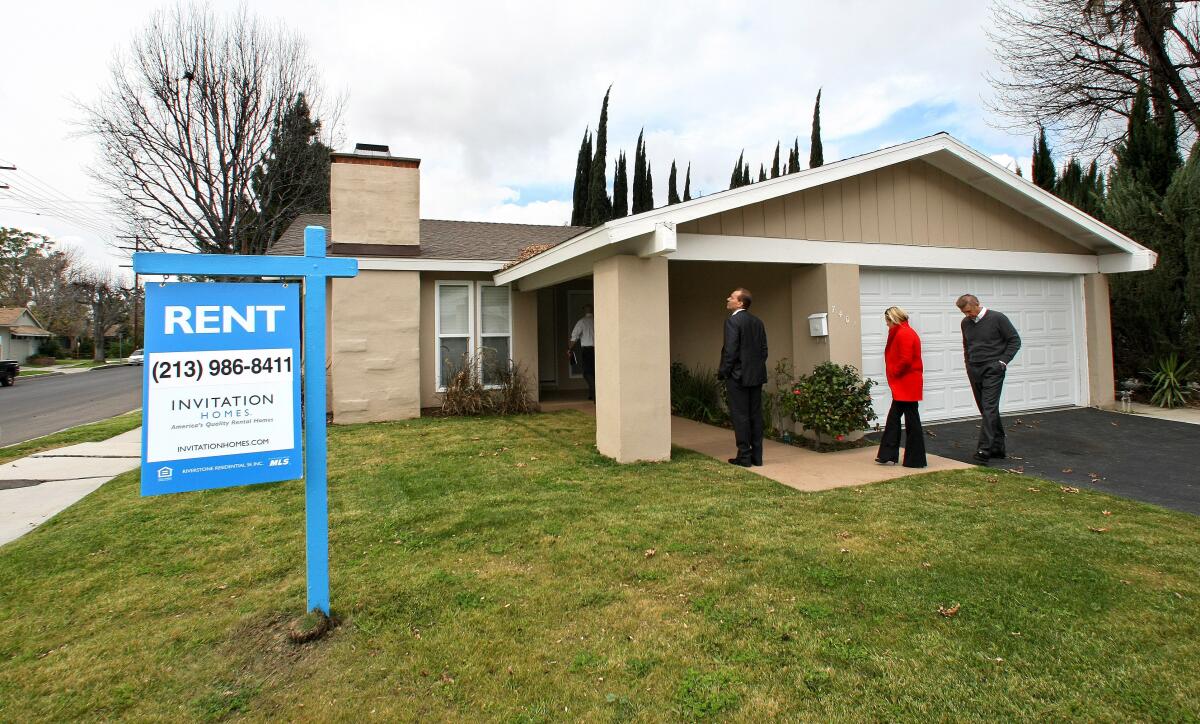Nation’s largest single-family home landlord to pay $3.7 million in California rent-gouging case

- Share via
The nation’s largest landlord of single-family home rentals will pay $3.7 million in civil penalties and restitution to resolve allegations it violated California laws against rent gouging, state Atty. Gen. Rob Bonta announced Monday.
Between October 2019 and December 2022, Invitation Homes, which owns 12,000 properties in California, increased rents for 1,900 tenants above the allowable amounts per state laws, according to Bonta’s office. The laws limit annual rent increases to 5% plus a regionally adjusted inflation figure and to no more than 10%.
Under a proposed settlement to be filed in Los Angeles County Superior Court on Monday, Invitation Homes will pay $2.04 million in penalties. The company is spending an additional $1.68 million to refund or credit tenants the amount it collected in excess of the state’s rent cap plus 5% interest, Bonta’s office said.
“California has laws in place to protect tenants from sudden, large rent increases and landlords need to be diligent in ensuring that they abide by those laws,” Bonta said in a statement. “The settlement announced today should serve as a reminder to landlords in California to familiarize themselves with the law and protections put in place to keep homes accessible to Californians.”
An attorney general’s office investigation found that a small percentage of the rent increases that Invitation Homes imposed from late 2019 through 2022 violated the rent cap laws and that the company had identified some of the problems through its own reviews and provided remediation to affected tenants, Bonta’s office said.
Kristi DesJarlais, an Invitation Homes spokesperson, emphasized in a statement that the company’s internal processes uncovered many of the issues prior to the company receiving any inquiries from the state.
“We are pleased to reach an expeditious and mutually favorable agreement on this matter with the California Department of Justice,” DesJarlais said. “We continue to stand proud of our overall business, and in this case, our transparency, timely cooperation and active engagement with the department.”
Signed by Gov. Gavin Newsom in 2019, California’s rent cap law has been one of the highest-profile responses to the state’s housing affordability problems. The law, one of the strictest limits on rent increases in the country, applies to all multifamily rental housing except for apartments built within the last 15 years. The law covers single-family home rentals operated by corporations or institutional investors such as Invitation Homes but exempts some other properties.
Currently, under the law, landlords are allowed to increase rents by no more than 8.8% in Los Angeles and Orange counties, 9.2% in the Bay Area and varying figures elsewhere in California. It affects properties built before 2008.
Some California cities, such as Los Angeles and San Francisco, have local rent control policies that more tightly limit rent increases in older buildings.
Explore the latest prices for homes and rentals in and around Los Angeles.
Monday’s settlement with Invitation Homes is the most significant enforcement action taken since the rent cap law went into effect four years ago. Tenant groups have criticized the law for being difficult to prosecute because renters often need to report potential violations to local and state authorities.
Besides the 2019 rent cap law, Bonta’s office alleged Invitation Homes violated separate laws that prohibit annual rent increases larger than 10% in local and statewide emergency periods, such as during the COVID-19 pandemic.
Under the proposed settlement, which needs approval from a judge, Invitation Homes will revamp its policies for administering rent increases in California, perform quarterly audits and provide an annual compliance report to the attorney general’s office for the next five years.
In the wake of the subprime mortgage crisis 15 years ago, large Wall Street investment firms began entering the single-family home rental market en masse. Some firms, including Dallas-based Invitation Homes, have faced criticism for high eviction rates and aggressive rent increases and for potentially crowding out individual home buyers. Defenders of single-family home rentals argue that the companies enable tenants to live in neighborhoods where they otherwise couldn’t afford to buy.
The percentage of single-family home rentals owned by large institutional investors remains small, just over 3% of the total, according to a recent Brookings Institution estimate, but such landlords have a bigger presence in some markets, especially the Sun Belt.
Invitation Homes operates 85,000 properties across the country. Its 12,000 in California accounted for 17% of the company’s $614 million in rental revenue during the three months that ended Sept. 30, according to its most recent quarterly financial report filed with the U.S. Securities and Exchange Commission. The $2,982 average monthly rent for Invitation Homes properties in Southern California is the highest in its nationwide portfolio, the report said.
Monday’s settlement comes at the beginning of what’s expected to be another year of intense debate on rent control in California. The Los Angeles-based AIDS Healthcare Foundation has qualified an initiative for the November statewide ballot that would expand the ability of local governments in California to implement stricter limits on rent hikes.
Landlord groups defeated similar foundation-backed initiatives in 2018 and 2020, outspending supporters more than 2 to 1 in campaigns that each topped $100 million. Invitation Homes has been one of the major donors to the anti-rent-control campaigns.
More to Read
Sign up for Essential California
The most important California stories and recommendations in your inbox every morning.
You may occasionally receive promotional content from the Los Angeles Times.








